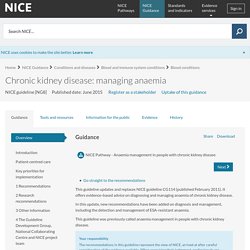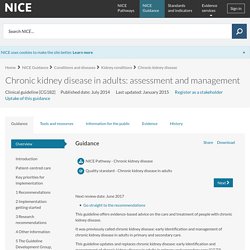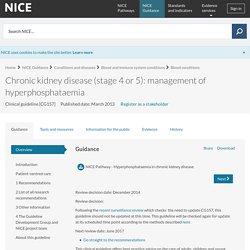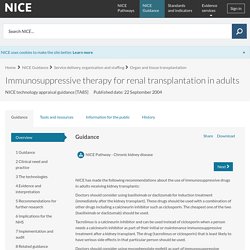

Kidney. UK RPG: The UK Renal Pharmacy Group. Chronic kidney disease: managing anaemia. This guideline updates and replaces NICE guideline CG114 (published February 2011).

It offers evidence-based advice on diagnosing and managing anaemia of chronic kidney disease. In this update, new recommendations have been added on diagnosis and management, including the detection and management of ESA-resistant anaemia. This guideline was previously called anaemia management in people with chronic kidney disease. Your responsibility The recommendations in this guideline represent the view of NICE, arrived at after careful consideration of the evidence available. Local commissioners and/or providers have a responsibility to enable the guideline to be applied when individual health professionals and their patients or service users wish to use it.
Chronic kidney disease in adults: assessment and management. Next review date: June 2017 Go straight to the recommendations This guideline offers evidence-based advice on the care and treatment of people with chronic kidney disease.

It was previously called chronic kidney disease: early identification and management of chronic kidney disease in adults in primary and secondary care. This guideline updates and replaces chronic kidney disease: early identification and management of chronic kidney disease in adults in primary and secondary care (CG73). Your responsibility The recommendations in this guideline represent the view of NICE, arrived at after careful consideration of the evidence available.
Local commissioners and/or providers have a responsibility to enable the guideline to be applied when individual health professionals and their patients or service users wish to use it. Chronic kidney disease (stage 4 or 5): management of hyperphosphataemia. Review decision date: December 2014 Review decision: Following the recent surveillance review which checks the need to update CG157, this guideline should not be updated at this time.

This guideline will be checked again for update at its scheduled time point according to the methods described here. Kidney International. IMPROVING GLOBAL OUTCOMES. UK RPG: The UK Renal Pharmacy Group. Kidney Stone Remedies Research & Treatment – KidneyAtlas.org. The National Kidney Foundation Kidney Disease Outcomes Quality Initiative (NKF KDOQI ) - The National Kidney Foundation.
IKA. A Guide to Kidney Transplantation - Beaumont Hospital. Nephrology - Renal Medicine - Cork University Hospital. Welcome to The Department of Renal Medicine at Cork University Hospital one of the country’s largest centres for patients with kidney disease.

We provide a full range of specialist treatments for patients with kidney disease and have a dedicated team based within the hospital and provide outreach services at Kerry General Hospital. Our main priority is the needs of our patients and their families. We are dedicated to improving outcomes for our patients and to ensuring their comfort. Cork University Hospital’s Cardiac Renal Centre was opened in 2010. Spanning 13,000m2 over 6 floors, the Centre represents an innovative service development recognising the key interdependencies of the specialties of Cardiology, Cardiothoracic Surgery and Renal Medicine.
Use the navigation links on the left to give you an insight into the care that we provide. Immunosuppressive therapy for renal transplantation in adults. NICE has made the following recommendations about the use of immunosuppressive drugs in adults receiving kidney transplants: Doctors should consider using basiliximab or daclizumab for induction treatment (immediately after the kidney transplant).

These drugs should be used with a combination of other drugs including a calcineurin inhibitor such as ciclosporin. The cheapest one of the two (basiliximab or daclizumab) should be used. Tacrolimus is a calcineurin inhibitor and can be used instead of ciclosporin when a person needs a calcineurin inhibitor as part of their initial or maintenance immunosuppressive treatment after a kidney transplant. The drug (tacrolimus or ciclosporin) that is least likely to have serious side effects in that particular person should be used. Doctors should consider using mycophenolate mofetil as part of immunosuppressive treatment after kidney transplant only when a person has to stop taking a calcineurin inhibitor, or has to take a lower dose.